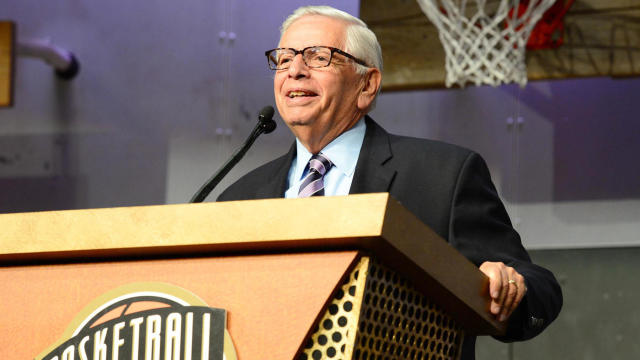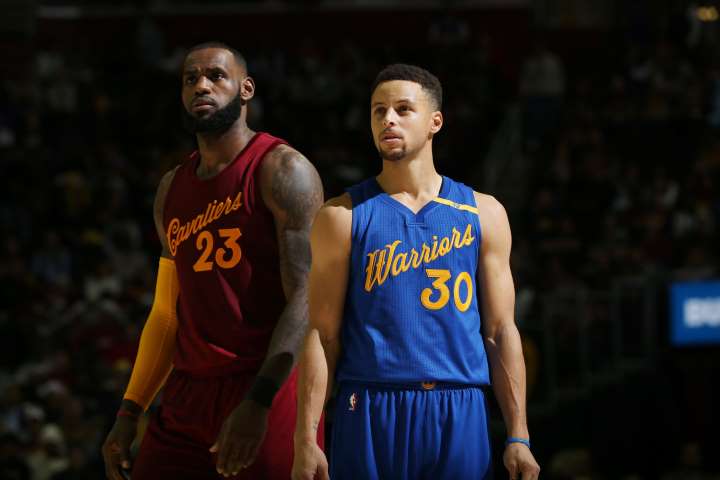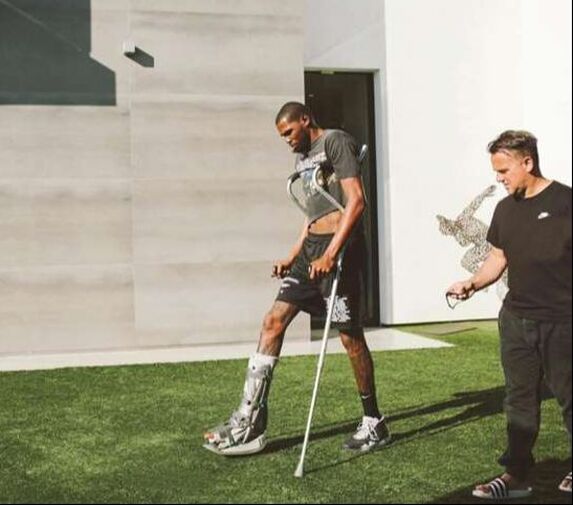Around the NBA: David Stern's Legacy, Load Management, Player of Decade and TV Ratings Decline1/12/2020 by Julian Spivey & Preston Tolliver David Stern's Legacy David Stern, who served as the NBA’s Commissioner from 1984-2014, died on January 1 at the age of 77. He had suffered a brain hemorrhage on December 12, 2019 and never recovered. I’m sure a lot of people don’t remember this – it was before mine and Preston’s time – but it wasn’t all that long ago (less than half a century) when the NBA Finals were shown on television via tape delay. Because the professional sport of basketball wasn’t important enough in the TV ratings to show it over regularly scheduled programming. In 2020 that seems ridiculous. Now, some credit bringing the NBA to the forefront of the sports world to Magic Johnson and Larry Bird and later Michael Jordan – and all three had an immeasurable impact on the game, but the success of the NBA not only in the U.S.A., but worldwide, happened to coincide with the commissionership of David Stern. The NBA went from something that’s biggest games could only be seen after your nightly local news hours after they ended to a must-see sport that’s second or third in the country in viewership. Now, like with any commissioner in any sport there were controversies during Stern’s tenure (which was the longest of any commissioner in the history of pro sports) that’ll also be a part of his legacy – like the trade blocking of Chris Paul to the Los Angeles Lakers or the lockouts and strikes that took place under his leadership – but, Stern was clearly one of the biggest influences and impactors in NBA history. JS I wasn’t a fan of the NBA before David Stern took the league’s iron throne as commissioner. Actually, I wasn’t even born. I didn’t know a league sans-Stern until 2014, when he retired and handed the reins to Adam Silver. When you’re raised in a nice house, with a sturdy roof over your head, you don’t really question how it got there, or who poured the concrete to keep it standing amid the storms. David Stern built the foundation for what the NBA is today, mostly in ways that today’s casual fans take for granted for having never known a world in which the NBA wasn’t a global powerhouse. To imagine an NBA without his influence is to imagine the world without the NBA at all. PT Player of the Decade: LeBron or Steph This topic was inspired by a New York Times piece deciding whether or not LeBron James or Stephen Curry was the NBA’s Player of the Decade for 2010-2019. It’s almost an impossible question to answer as the two were arguably the two best professional athletes in any team sports of the decade, not just the NBA, but ultimately the publication decided that Curry was the player of the decade. In December, Eric Fulton and I published a 40 Best Athletes of the Decade piece for this very website. LeBron James was chosen as the greatest athlete of the decade. LeBron James was ranked as the greatest athlete of the decade. Stephen Curry was ranked sixth. So, according to that you’re probably thinking I’m about to disagree with the New York Times’ choice of Curry as the greatest NBA player of the decade … but I’m not. How can I choose Curry, who in a previous piece admitted wasn’t ranked as high as LBJ when it came to athletes of the decade, as the NBA player of the decade? The reason is I agree with the New York Times’ reasoning for choosing Curry. Impact on the game. James might have been the best player statistically in the NBA, but Curry changed the way the game was played in the NBA. Now almost every team in the league has adapted Curry’s style of three-point shooting as the way to go – you can argue amongst yourselves whether that’s a positive or negative impact on the game. It’s been a long time since the NBA has seen one athlete almost single-handedly change the way the game is played and that’s Curry, not James. JS It’s almost unfair to try to determine the athlete of the decade when two men singlehandedly carried the league throughout the 2010s; LeBron James was the King in the first half before handing the throne to Steph Curry to finish out on top of the decade. But recency bias be damned, we cannot forget how LeBron carried the league on his shoulders, like a cyborg Atlas. While Curry and his lights out, unreasonable and absolutely unfair shooting from behind the 3-point arc have been game-changing as we head to a new era (for more on how the game has transitioned to one with significantly more 3-pointers, check out Kirk Goldberry’s SprawlBall, or just turn your tv onto any of these 140-115 point games). But when Curry was just cutting his teeth, LeBron was winning championships, and aside from last year when the Raptors bested the Warriors, he’s been a constant foil to Curry on the road to every Warriors championship. He’s also been more durable, but you can’t blame Curry for being a human being, with human bones and human injuries. LeBron James was created in a Skynet lab and sent back in time to wreak havoc on the basketball court. Both men bear a large amount of responsibility for how the game of basketball is played today, and it would be fair to argue that shooters like Curry (who is undeniably the best among them) have laid the groundwork for what the NBA will look like in the 2020s. But we can’t forget how LeBron reshaped the 2010s, from his time with Miami to making Cleveland a relevant sports city again to rejuvenating the Lakers today. We’ve never had an argument about Steph Curry being better than Michael Jordan - LeBron made his case for best in NBA history over the last 10 years. PT Load Management Kawhi Leonard is arguably a top-3 player in the NBA today. He’s a two-time Finals MVP and one of the best defenders we’ve seen this side of Scottie Pippen. He’s also, speaking from experience, the worst freakin’ guy for a fantasy team. That’s not because he’s one of those players whose impact on the court is unquantifiable in the stat book (he is). It’s because load management has made his impact on a fantasy team into a game of Russian Roulette - when he plays, he’s great. But you’re relying on a big if, especially if he’s on a back-to-back. Fantasy sports aside, it also devalues the game for the average NBA fan. When you’re in a city like Orlando or Memphis or, God help you, Atlanta, you don’t have a lot to look forward to with your team. You’re not making a big playoff push, and you’re taking more L’s on the home court than wins. The draw, at that point is to see the stars play when they come to town: to catch LeBron drop a thousand points on your team; to see Steph Curry shoot fireballs into the net like in NBA Jam; to see Joel Embiid make fun of someone’s mom (or whatever it is he says to piss everyone off all the time). The very concept of load management is a middle finger to the fans who, unlike NBA players, aren’t swimming in vaults full of millions of dollars like Scrooge McDuck; fans who are spending their hard-earned money to see their favorite players. So, what should coaches change to fix this problem? Not a damned thing. A coach’s responsibility is to his team and his players to ensure the best odds of raising a championship trophy at the end of the season. If a coach determines the best thing to do is to assign his star player 48 or 20 or five or zero minutes, that’s his prerogative. That doesn’t mean the league shouldn’t find a way to fix it so they can retain fans (and all their money) - they should - but a coach should take advantage of whatever rules are there to win the game. In the old Mortal Kombat games, there was a trick to winning each fight - you got your opponent to the side of the screen and ducked down and spammed the low kick button until your opponent died of a mild shin injury. It was cheap and frustrating, but you bet your ass I did it. Was I wrong? Maybe, but it was on the game to fix it. Until the league fixes its play requirements for players, let the coaches span the low kick button. PT The NBA considers load management one of the biggest issues it has to face. So much, in fact, that it might consider future rules to enforce teams to play athletes unless the league is certain they are unhealthy. I’m old school in that I want players on the court if healthy, and even to some extent if just suffering from mild injuries or illnesses. I appreciate the LeBron James of the world, who even at an advanced age for the NBA, say that if they’re healthy they’re playing. That’s the kind of professional work ethic we should all strive to have. Players like Kawhi Leonard intentionally sitting so they can be in better shape for the playoffs might be a good strategy – it obviously worked out well for Leonard and the Toronto Raptors last season while Golden State Warriors stars were dropping like flies – but it makes me view Leonard as soft. As long as Leonard is hoisting championship trophies though I’m sure he’s OK with a fat guy on his couch in Arkansas viewing him as soft. Despite the fact that load management annoys me I’m in line with Preston in viewing it as a strategy for coaches and athletes of the league to take advantage of … if it isn’t illegal, go for it. We have at least some evidence that load management is effective. And, as much as it annoys me, I don’t believe the NBA should step up and try to ensure that this doesn’t happen – even if it impacts fans spending money or TV ratings – because I just don’t believe the league should have this much control over how franchises strategize. JS Decline in TV Ratings The NBA is arguably stacked with the most talent in its history. Players like Kevin Durant, LeBron James, Steph Curry, James Harden, Luka Doncic, Giannis Antetokounmpo and Anthony Davis make any game must-watch. So why are ratings down?
The fact that this season has been cursed with injuries to some of its biggest stars notwithstanding, the league is facing the same problem a lot of others are. We live in the cord-cutting era, and the NBA’s streaming service, League Pass, is unreliable and flaky at best. The cost alone makes it difficult for the casual fan, and blackouts for local channels and nationally-televised games makes it money not well spent, not to mention that the cost only permits the viewer to choose a couple select teams to follow. If the NBA is really concerned about ratings, it would be wise to offer a more affordable streaming service that makes games more accessible. PT Preston makes a great point about cord-cutting, which has definitely affected the ratings for literally everything on television over the last half-decade or so. Cord-cutting has proven to be a major factor in the decline of sports viewing in this country as many in the younger generations are giving up cable and other traditional means of TV viewing for the cheaper outlets of streaming (though with some many streaming services popping up it’ll soon be less cost saving to do so if you want everything), which has harmed all live events (award show ratings have been in decline too). But I think the biggest impact this season is something Preston briefly touched upon – the injuries to major superstars. If you were to rank the most popular athletes in the NBA, I believe that LeBron James would rank first, followed closely by Stephen Curry and then probably Kevin Durant would come in third. Curry played less than four games this season before suffering a broken hand that looks to have him missing the remaining of the season and Durant was never going to set foot on court for his new team the Brooklyn Nets this season due to a major injury sustain in the playoffs last season. If two of the league’s three most popular and arguably best players aren’t able to lace up their sneakers it’s going to impact the ratings, especially in a sport that always been more athlete and personality driven than team driven. It also doesn’t help that injuries to Curry and Klay Thompson and the loss of Durant have relegated perhaps the league’s most popular and most-watched team of the last half decade in the Golden State Warriors to a league’s second worst win-loss record of the season. JS
0 Comments
Leave a Reply. |
Archives
July 2024
|



